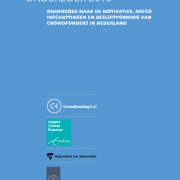Current State of Crowdfunding in Spain 2016
An overview

Inhabitants: 46,44 million
GDP (ppp) per capita: $35,269
(Source: Wikipedia; Image Credit: NuclearVacuum)
Although it is being 7 years since the crowdfunding came into use and expands in Spain, the growth of this industry has been unequal. There have been many platforms that have emerged in these years of evolution in the field of reward and donation based crowdfunding, which was the first type of most popular crowdfunding. However, this number of platforms has varied because there have emerged new types of crowdfunding that have been gaining strength in Spain, as the crowdlending or equity crowdfunding. The current number of crowdfunding platforms in Spain is around 52. It is a relatively young but continuously growing market and it is leading increasingly to investment products.
Volumes (2014)
- Donation based crowdfunding: €0,8 million
- Reward based crowdfunding: €35,1million
- P2P consumer lending: no data available.
- P2P business lending: €13,7 million
- Equity based crowdfunding: €10,7 million
(Source: Moving Mainstream, The European Alternative Finance Benchmarking Report, University of Cambridge)
Local platforms
Verkami and Lanzanos are reward based crowdfunding platforms for creative projects. Both are founded in 2010.
Goteo (2010) is a platform for civic crowdfunding and collaboration on citizen initiatives and social, cultural, technological and educational projects.
Libros.com is a crowdfunding platform with the focus on the publishing of books
Foreign Platforms
Kickstarter and Indiegogo
CrowdCube, equity based crowdfunding platform from the UK.
FundedByMe (2011) focuses on equity-based crowdfunding + P2P consumer lending.
Ulule, reward based crowdfunding platform from France.
Regulations
The main regulation of the crowdfunding industry in Spain is oriented to the equity crowdfunding and crowdlending. The law 5/2015 of 27 April to promote the business financing has represented a total control and regulation of the investment in crowdfunding platforms. This regulation considers two kind of investors, qualified and unqualified, and setting limits of investment for each type of investors:
Qualified investors: have a total income of more than €50.000 per year or a financial asset of more than €100.000
Unqualified investors: those with less than €50.000 of income per year.
Only qualified investors can invest more than €3.000 in the same project or more than €10.000 in the same platform per year.
Unqualified investors only can invest less than 3000 € per project.
This regulation has provided more security and protection for investors in Spain
However, on the other hand it has meant the establishment of requirements for platforms that have caused many of those already operating in the field of equity crowdfunding have had to redirect their activity or look for ways to meet the stringent requirements set by the law.
Platforms must be registered at the CNMV (the agency in charge of supervising and inspecting the Spanish Stock Markets) or at the Bank of Spain in order to develop their activities. They must have a capital stock totally disbursed of €60.000 as well as a liability insurance.
Donation and reward based crowdfunding is not being regulated in Spain. In this kind of crowdfunding the general laws affecting to the VAT or tax allowance apply.
Banks
The Spanish banking system has passed to see the crowdfunding in all types as a threat or interference in their activity to happen to him as a possibility to seek alliances or refocus the banking system by expanding the types of products offered.
In fact, there are already several examples of established alliances between banks and companies in the field of crowdfunding. Similarly, banks and financial institutions have developed their own donation and reward based crowdfunding platforms.
Investors, meanwhile, are finding new ways of investing their resources not previously found and this has facilitated obtain higher returns for them and achieve project financing. Still some way to go and banking in Spain is reinventing.
Our expert

The Current State of Crowdfunding in Spain is made possible by the contribution of Eva Mª Gómez Jiménez
What is the potential of crowdfunding in your country?
This industry, being so young, has a great ride yet in Spain that continues to emerge new formulas linked to the field of crowdfunding and Fintech such as crowdimpacting or crowdfactoring. It is an industry constantly changing and will continue to generate new avenues of activity.
What are the biggest challenges?
The main challenge in this industry is to spread the message of what this kind of crowdfunding is and how an enterprise can raise money from a crowdfunding platform. So the challenge is about education in crowdfunding, and diffusion about the way of accessing to the alternative finance industry for the entire society.
What is the future holding for Spain?
The future of crowdfunding in Spain has good perspectives because there is yet a long way for the development of the industry and the creation of new models into the industry. The global increment in the number of platforms and start-ups in this sector as well as the growth in the amount of money achieved for the financing of projects and enterprises is a good proof of this.









